University Assignment: Analysis Related to Alibaba FDI Activities
VerifiedAdded on 2021/04/21
|12
|3006
|64
Essay
AI Summary
This essay provides an analysis of Alibaba Group's foreign direct investment (FDI) activities, focusing on the application of Dunning's eclectic paradigm, specifically the OLI framework. The analysis explores how Alibaba's ownership advantages, location-specific advantages, and internationalization advantages influence its FDI decisions. The essay examines the competitive advantages of Alibaba, including its strong networking capabilities, and how these advantages enable the company to expand into new markets, such as India. The location analysis considers the economic, political, and social factors that affect Alibaba's investment decisions. The internationalization section discusses different modes of international production and the implications of each for Alibaba, with a focus on the potential benefits of a wholly owned subsidiary. The essay highlights the importance of understanding the costs and risks associated with international expansion and the strategic choices that Alibaba must make to succeed in foreign markets.
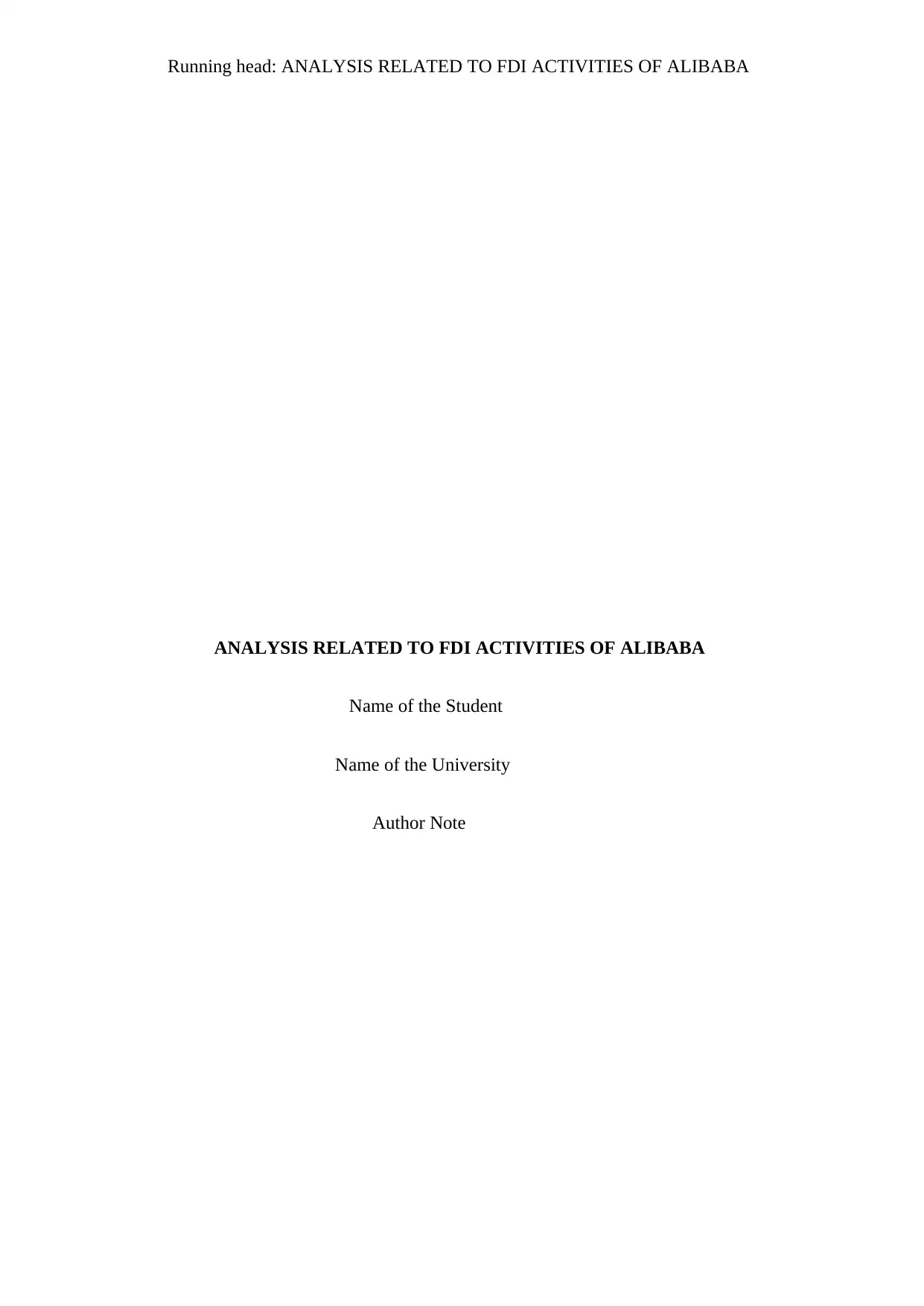
Running head: ANALYSIS RELATED TO FDI ACTIVITIES OF ALIBABA
ANALYSIS RELATED TO FDI ACTIVITIES OF ALIBABA
Name of the Student
Name of the University
Author Note
ANALYSIS RELATED TO FDI ACTIVITIES OF ALIBABA
Name of the Student
Name of the University
Author Note
Paraphrase This Document
Need a fresh take? Get an instant paraphrase of this document with our AI Paraphraser
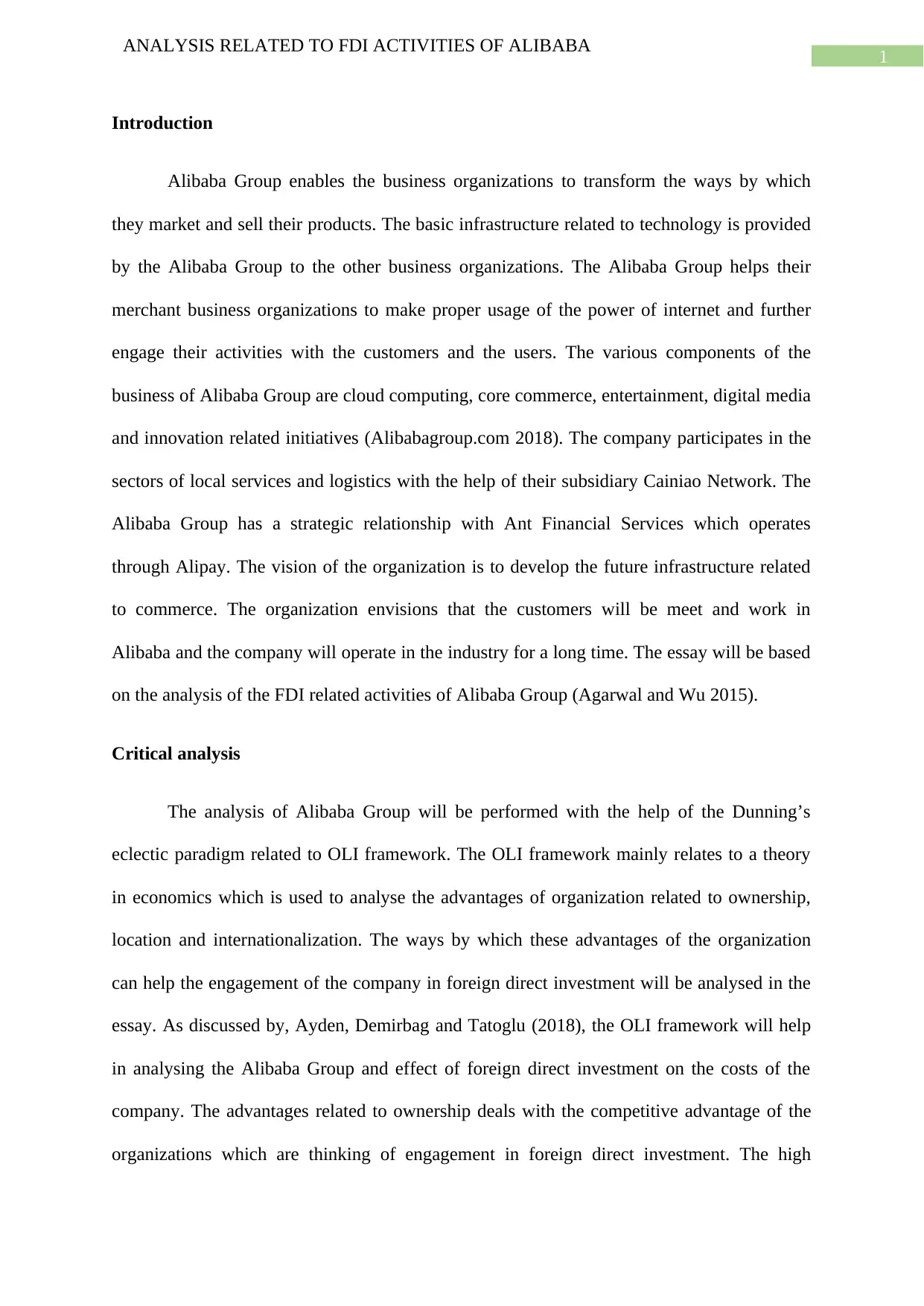
1
ANALYSIS RELATED TO FDI ACTIVITIES OF ALIBABA
Introduction
Alibaba Group enables the business organizations to transform the ways by which
they market and sell their products. The basic infrastructure related to technology is provided
by the Alibaba Group to the other business organizations. The Alibaba Group helps their
merchant business organizations to make proper usage of the power of internet and further
engage their activities with the customers and the users. The various components of the
business of Alibaba Group are cloud computing, core commerce, entertainment, digital media
and innovation related initiatives (Alibabagroup.com 2018). The company participates in the
sectors of local services and logistics with the help of their subsidiary Cainiao Network. The
Alibaba Group has a strategic relationship with Ant Financial Services which operates
through Alipay. The vision of the organization is to develop the future infrastructure related
to commerce. The organization envisions that the customers will be meet and work in
Alibaba and the company will operate in the industry for a long time. The essay will be based
on the analysis of the FDI related activities of Alibaba Group (Agarwal and Wu 2015).
Critical analysis
The analysis of Alibaba Group will be performed with the help of the Dunning’s
eclectic paradigm related to OLI framework. The OLI framework mainly relates to a theory
in economics which is used to analyse the advantages of organization related to ownership,
location and internationalization. The ways by which these advantages of the organization
can help the engagement of the company in foreign direct investment will be analysed in the
essay. As discussed by, Ayden, Demirbag and Tatoglu (2018), the OLI framework will help
in analysing the Alibaba Group and effect of foreign direct investment on the costs of the
company. The advantages related to ownership deals with the competitive advantage of the
organizations which are thinking of engagement in foreign direct investment. The high
ANALYSIS RELATED TO FDI ACTIVITIES OF ALIBABA
Introduction
Alibaba Group enables the business organizations to transform the ways by which
they market and sell their products. The basic infrastructure related to technology is provided
by the Alibaba Group to the other business organizations. The Alibaba Group helps their
merchant business organizations to make proper usage of the power of internet and further
engage their activities with the customers and the users. The various components of the
business of Alibaba Group are cloud computing, core commerce, entertainment, digital media
and innovation related initiatives (Alibabagroup.com 2018). The company participates in the
sectors of local services and logistics with the help of their subsidiary Cainiao Network. The
Alibaba Group has a strategic relationship with Ant Financial Services which operates
through Alipay. The vision of the organization is to develop the future infrastructure related
to commerce. The organization envisions that the customers will be meet and work in
Alibaba and the company will operate in the industry for a long time. The essay will be based
on the analysis of the FDI related activities of Alibaba Group (Agarwal and Wu 2015).
Critical analysis
The analysis of Alibaba Group will be performed with the help of the Dunning’s
eclectic paradigm related to OLI framework. The OLI framework mainly relates to a theory
in economics which is used to analyse the advantages of organization related to ownership,
location and internationalization. The ways by which these advantages of the organization
can help the engagement of the company in foreign direct investment will be analysed in the
essay. As discussed by, Ayden, Demirbag and Tatoglu (2018), the OLI framework will help
in analysing the Alibaba Group and effect of foreign direct investment on the costs of the
company. The advantages related to ownership deals with the competitive advantage of the
organizations which are thinking of engagement in foreign direct investment. The high
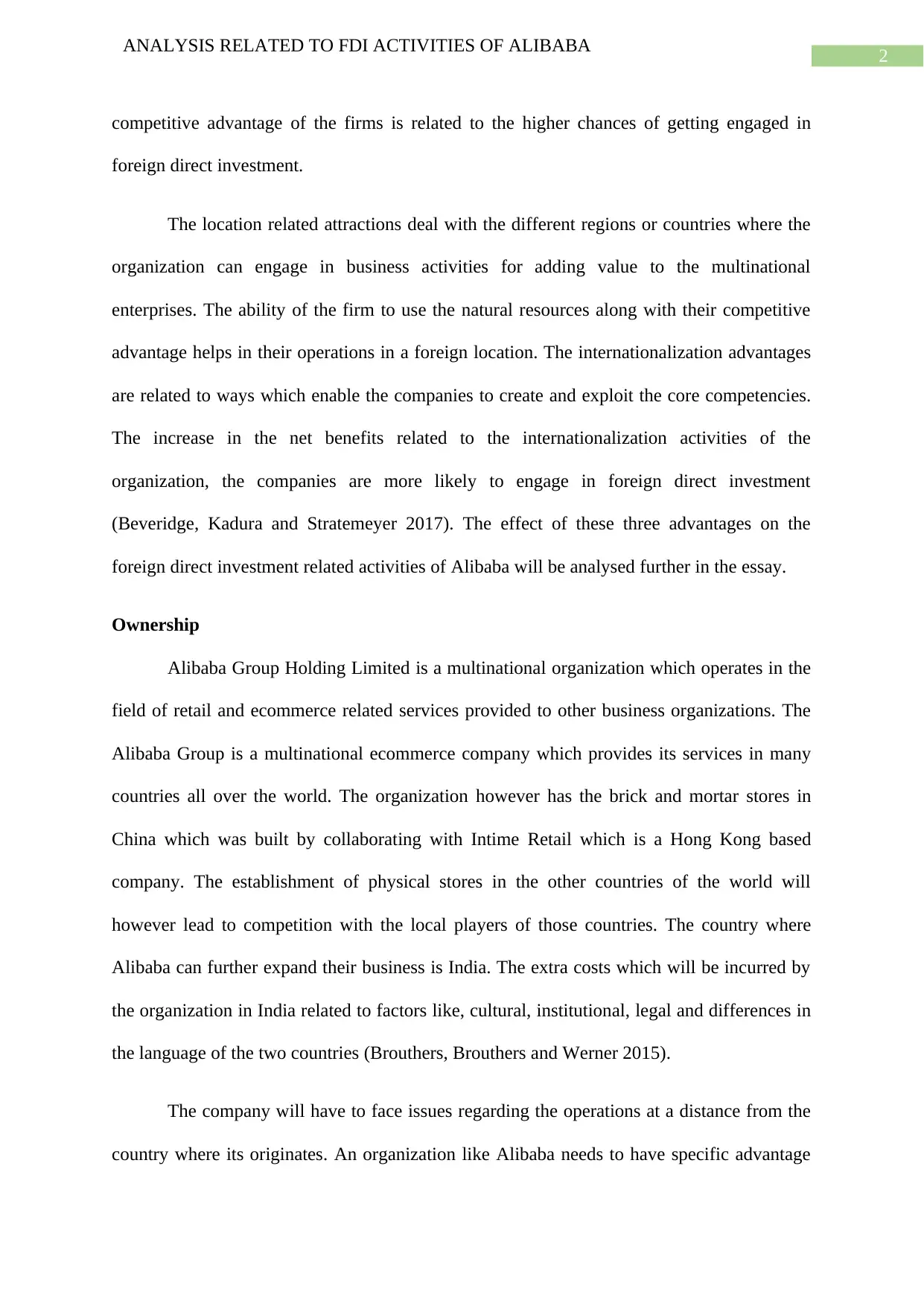
2
ANALYSIS RELATED TO FDI ACTIVITIES OF ALIBABA
competitive advantage of the firms is related to the higher chances of getting engaged in
foreign direct investment.
The location related attractions deal with the different regions or countries where the
organization can engage in business activities for adding value to the multinational
enterprises. The ability of the firm to use the natural resources along with their competitive
advantage helps in their operations in a foreign location. The internationalization advantages
are related to ways which enable the companies to create and exploit the core competencies.
The increase in the net benefits related to the internationalization activities of the
organization, the companies are more likely to engage in foreign direct investment
(Beveridge, Kadura and Stratemeyer 2017). The effect of these three advantages on the
foreign direct investment related activities of Alibaba will be analysed further in the essay.
Ownership
Alibaba Group Holding Limited is a multinational organization which operates in the
field of retail and ecommerce related services provided to other business organizations. The
Alibaba Group is a multinational ecommerce company which provides its services in many
countries all over the world. The organization however has the brick and mortar stores in
China which was built by collaborating with Intime Retail which is a Hong Kong based
company. The establishment of physical stores in the other countries of the world will
however lead to competition with the local players of those countries. The country where
Alibaba can further expand their business is India. The extra costs which will be incurred by
the organization in India related to factors like, cultural, institutional, legal and differences in
the language of the two countries (Brouthers, Brouthers and Werner 2015).
The company will have to face issues regarding the operations at a distance from the
country where its originates. An organization like Alibaba needs to have specific advantage
ANALYSIS RELATED TO FDI ACTIVITIES OF ALIBABA
competitive advantage of the firms is related to the higher chances of getting engaged in
foreign direct investment.
The location related attractions deal with the different regions or countries where the
organization can engage in business activities for adding value to the multinational
enterprises. The ability of the firm to use the natural resources along with their competitive
advantage helps in their operations in a foreign location. The internationalization advantages
are related to ways which enable the companies to create and exploit the core competencies.
The increase in the net benefits related to the internationalization activities of the
organization, the companies are more likely to engage in foreign direct investment
(Beveridge, Kadura and Stratemeyer 2017). The effect of these three advantages on the
foreign direct investment related activities of Alibaba will be analysed further in the essay.
Ownership
Alibaba Group Holding Limited is a multinational organization which operates in the
field of retail and ecommerce related services provided to other business organizations. The
Alibaba Group is a multinational ecommerce company which provides its services in many
countries all over the world. The organization however has the brick and mortar stores in
China which was built by collaborating with Intime Retail which is a Hong Kong based
company. The establishment of physical stores in the other countries of the world will
however lead to competition with the local players of those countries. The country where
Alibaba can further expand their business is India. The extra costs which will be incurred by
the organization in India related to factors like, cultural, institutional, legal and differences in
the language of the two countries (Brouthers, Brouthers and Werner 2015).
The company will have to face issues regarding the operations at a distance from the
country where its originates. An organization like Alibaba needs to have specific advantage
⊘ This is a preview!⊘
Do you want full access?
Subscribe today to unlock all pages.

Trusted by 1+ million students worldwide
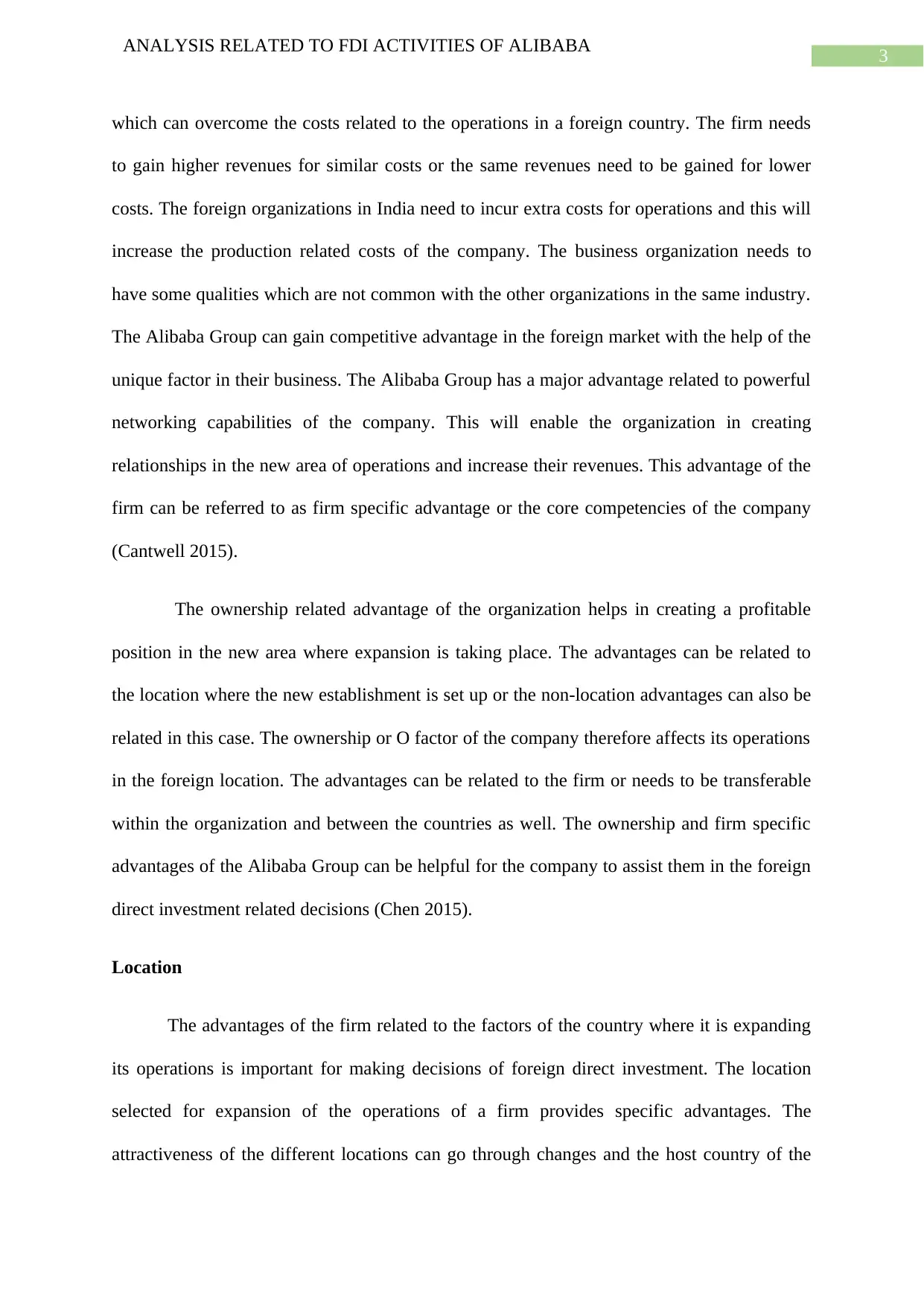
3
ANALYSIS RELATED TO FDI ACTIVITIES OF ALIBABA
which can overcome the costs related to the operations in a foreign country. The firm needs
to gain higher revenues for similar costs or the same revenues need to be gained for lower
costs. The foreign organizations in India need to incur extra costs for operations and this will
increase the production related costs of the company. The business organization needs to
have some qualities which are not common with the other organizations in the same industry.
The Alibaba Group can gain competitive advantage in the foreign market with the help of the
unique factor in their business. The Alibaba Group has a major advantage related to powerful
networking capabilities of the company. This will enable the organization in creating
relationships in the new area of operations and increase their revenues. This advantage of the
firm can be referred to as firm specific advantage or the core competencies of the company
(Cantwell 2015).
The ownership related advantage of the organization helps in creating a profitable
position in the new area where expansion is taking place. The advantages can be related to
the location where the new establishment is set up or the non-location advantages can also be
related in this case. The ownership or O factor of the company therefore affects its operations
in the foreign location. The advantages can be related to the firm or needs to be transferable
within the organization and between the countries as well. The ownership and firm specific
advantages of the Alibaba Group can be helpful for the company to assist them in the foreign
direct investment related decisions (Chen 2015).
Location
The advantages of the firm related to the factors of the country where it is expanding
its operations is important for making decisions of foreign direct investment. The location
selected for expansion of the operations of a firm provides specific advantages. The
attractiveness of the different locations can go through changes and the host country of the
ANALYSIS RELATED TO FDI ACTIVITIES OF ALIBABA
which can overcome the costs related to the operations in a foreign country. The firm needs
to gain higher revenues for similar costs or the same revenues need to be gained for lower
costs. The foreign organizations in India need to incur extra costs for operations and this will
increase the production related costs of the company. The business organization needs to
have some qualities which are not common with the other organizations in the same industry.
The Alibaba Group can gain competitive advantage in the foreign market with the help of the
unique factor in their business. The Alibaba Group has a major advantage related to powerful
networking capabilities of the company. This will enable the organization in creating
relationships in the new area of operations and increase their revenues. This advantage of the
firm can be referred to as firm specific advantage or the core competencies of the company
(Cantwell 2015).
The ownership related advantage of the organization helps in creating a profitable
position in the new area where expansion is taking place. The advantages can be related to
the location where the new establishment is set up or the non-location advantages can also be
related in this case. The ownership or O factor of the company therefore affects its operations
in the foreign location. The advantages can be related to the firm or needs to be transferable
within the organization and between the countries as well. The ownership and firm specific
advantages of the Alibaba Group can be helpful for the company to assist them in the foreign
direct investment related decisions (Chen 2015).
Location
The advantages of the firm related to the factors of the country where it is expanding
its operations is important for making decisions of foreign direct investment. The location
selected for expansion of the operations of a firm provides specific advantages. The
attractiveness of the different locations can go through changes and the host country of the
Paraphrase This Document
Need a fresh take? Get an instant paraphrase of this document with our AI Paraphraser
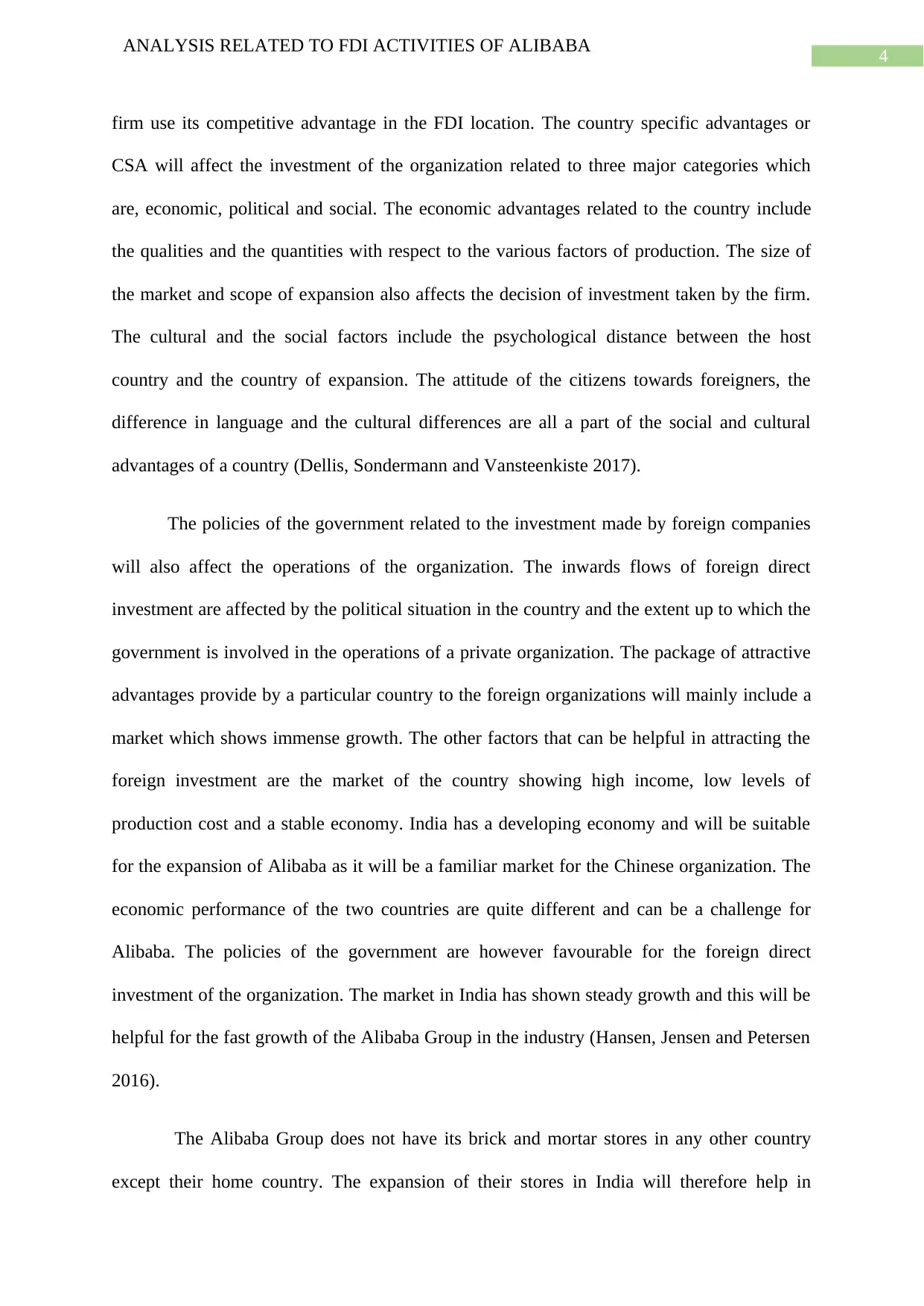
4
ANALYSIS RELATED TO FDI ACTIVITIES OF ALIBABA
firm use its competitive advantage in the FDI location. The country specific advantages or
CSA will affect the investment of the organization related to three major categories which
are, economic, political and social. The economic advantages related to the country include
the qualities and the quantities with respect to the various factors of production. The size of
the market and scope of expansion also affects the decision of investment taken by the firm.
The cultural and the social factors include the psychological distance between the host
country and the country of expansion. The attitude of the citizens towards foreigners, the
difference in language and the cultural differences are all a part of the social and cultural
advantages of a country (Dellis, Sondermann and Vansteenkiste 2017).
The policies of the government related to the investment made by foreign companies
will also affect the operations of the organization. The inwards flows of foreign direct
investment are affected by the political situation in the country and the extent up to which the
government is involved in the operations of a private organization. The package of attractive
advantages provide by a particular country to the foreign organizations will mainly include a
market which shows immense growth. The other factors that can be helpful in attracting the
foreign investment are the market of the country showing high income, low levels of
production cost and a stable economy. India has a developing economy and will be suitable
for the expansion of Alibaba as it will be a familiar market for the Chinese organization. The
economic performance of the two countries are quite different and can be a challenge for
Alibaba. The policies of the government are however favourable for the foreign direct
investment of the organization. The market in India has shown steady growth and this will be
helpful for the fast growth of the Alibaba Group in the industry (Hansen, Jensen and Petersen
2016).
The Alibaba Group does not have its brick and mortar stores in any other country
except their home country. The expansion of their stores in India will therefore help in
ANALYSIS RELATED TO FDI ACTIVITIES OF ALIBABA
firm use its competitive advantage in the FDI location. The country specific advantages or
CSA will affect the investment of the organization related to three major categories which
are, economic, political and social. The economic advantages related to the country include
the qualities and the quantities with respect to the various factors of production. The size of
the market and scope of expansion also affects the decision of investment taken by the firm.
The cultural and the social factors include the psychological distance between the host
country and the country of expansion. The attitude of the citizens towards foreigners, the
difference in language and the cultural differences are all a part of the social and cultural
advantages of a country (Dellis, Sondermann and Vansteenkiste 2017).
The policies of the government related to the investment made by foreign companies
will also affect the operations of the organization. The inwards flows of foreign direct
investment are affected by the political situation in the country and the extent up to which the
government is involved in the operations of a private organization. The package of attractive
advantages provide by a particular country to the foreign organizations will mainly include a
market which shows immense growth. The other factors that can be helpful in attracting the
foreign investment are the market of the country showing high income, low levels of
production cost and a stable economy. India has a developing economy and will be suitable
for the expansion of Alibaba as it will be a familiar market for the Chinese organization. The
economic performance of the two countries are quite different and can be a challenge for
Alibaba. The policies of the government are however favourable for the foreign direct
investment of the organization. The market in India has shown steady growth and this will be
helpful for the fast growth of the Alibaba Group in the industry (Hansen, Jensen and Petersen
2016).
The Alibaba Group does not have its brick and mortar stores in any other country
except their home country. The expansion of their stores in India will therefore help in
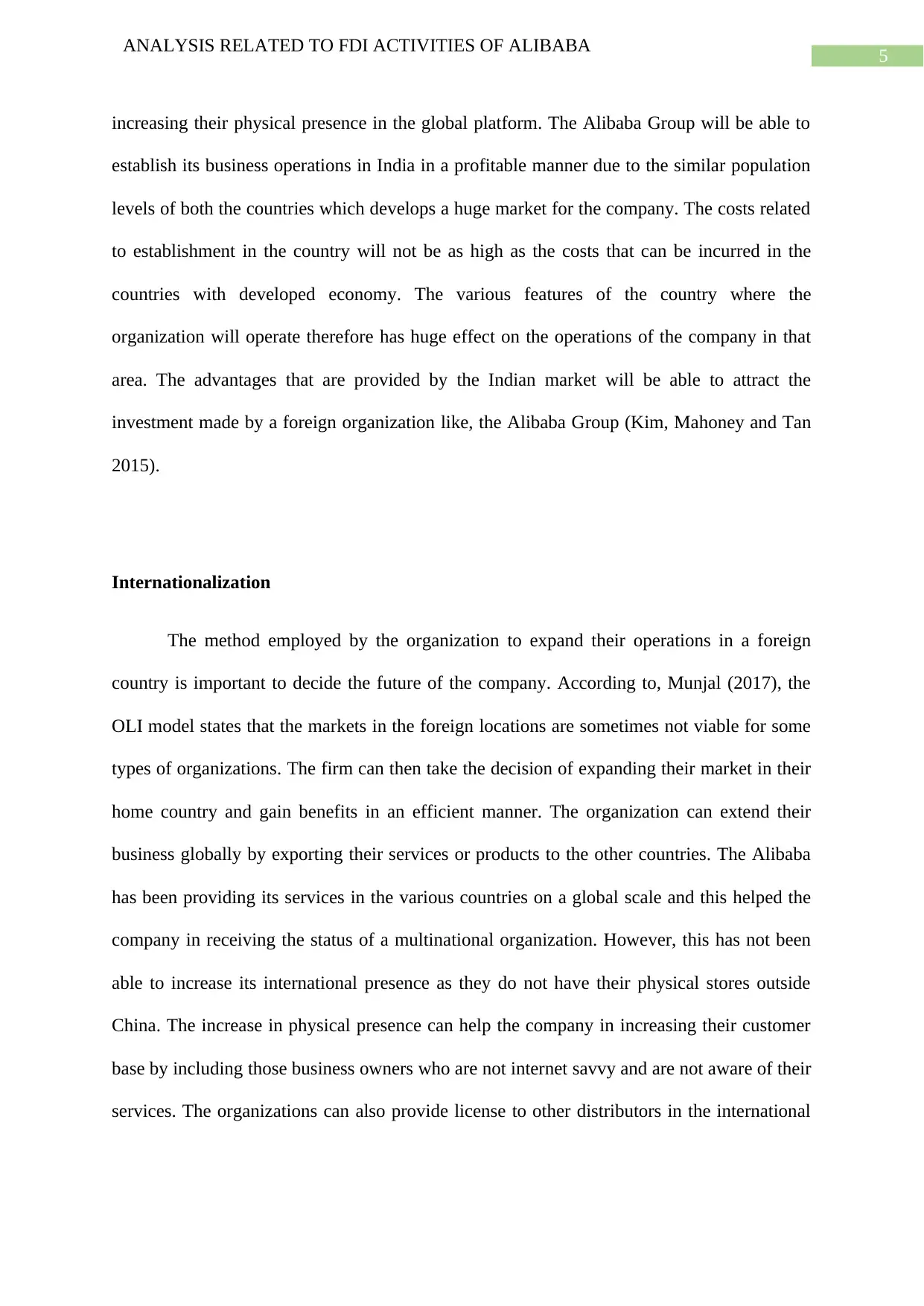
5
ANALYSIS RELATED TO FDI ACTIVITIES OF ALIBABA
increasing their physical presence in the global platform. The Alibaba Group will be able to
establish its business operations in India in a profitable manner due to the similar population
levels of both the countries which develops a huge market for the company. The costs related
to establishment in the country will not be as high as the costs that can be incurred in the
countries with developed economy. The various features of the country where the
organization will operate therefore has huge effect on the operations of the company in that
area. The advantages that are provided by the Indian market will be able to attract the
investment made by a foreign organization like, the Alibaba Group (Kim, Mahoney and Tan
2015).
Internationalization
The method employed by the organization to expand their operations in a foreign
country is important to decide the future of the company. According to, Munjal (2017), the
OLI model states that the markets in the foreign locations are sometimes not viable for some
types of organizations. The firm can then take the decision of expanding their market in their
home country and gain benefits in an efficient manner. The organization can extend their
business globally by exporting their services or products to the other countries. The Alibaba
has been providing its services in the various countries on a global scale and this helped the
company in receiving the status of a multinational organization. However, this has not been
able to increase its international presence as they do not have their physical stores outside
China. The increase in physical presence can help the company in increasing their customer
base by including those business owners who are not internet savvy and are not aware of their
services. The organizations can also provide license to other distributors in the international
ANALYSIS RELATED TO FDI ACTIVITIES OF ALIBABA
increasing their physical presence in the global platform. The Alibaba Group will be able to
establish its business operations in India in a profitable manner due to the similar population
levels of both the countries which develops a huge market for the company. The costs related
to establishment in the country will not be as high as the costs that can be incurred in the
countries with developed economy. The various features of the country where the
organization will operate therefore has huge effect on the operations of the company in that
area. The advantages that are provided by the Indian market will be able to attract the
investment made by a foreign organization like, the Alibaba Group (Kim, Mahoney and Tan
2015).
Internationalization
The method employed by the organization to expand their operations in a foreign
country is important to decide the future of the company. According to, Munjal (2017), the
OLI model states that the markets in the foreign locations are sometimes not viable for some
types of organizations. The firm can then take the decision of expanding their market in their
home country and gain benefits in an efficient manner. The organization can extend their
business globally by exporting their services or products to the other countries. The Alibaba
has been providing its services in the various countries on a global scale and this helped the
company in receiving the status of a multinational organization. However, this has not been
able to increase its international presence as they do not have their physical stores outside
China. The increase in physical presence can help the company in increasing their customer
base by including those business owners who are not internet savvy and are not aware of their
services. The organizations can also provide license to other distributors in the international
⊘ This is a preview!⊘
Do you want full access?
Subscribe today to unlock all pages.

Trusted by 1+ million students worldwide
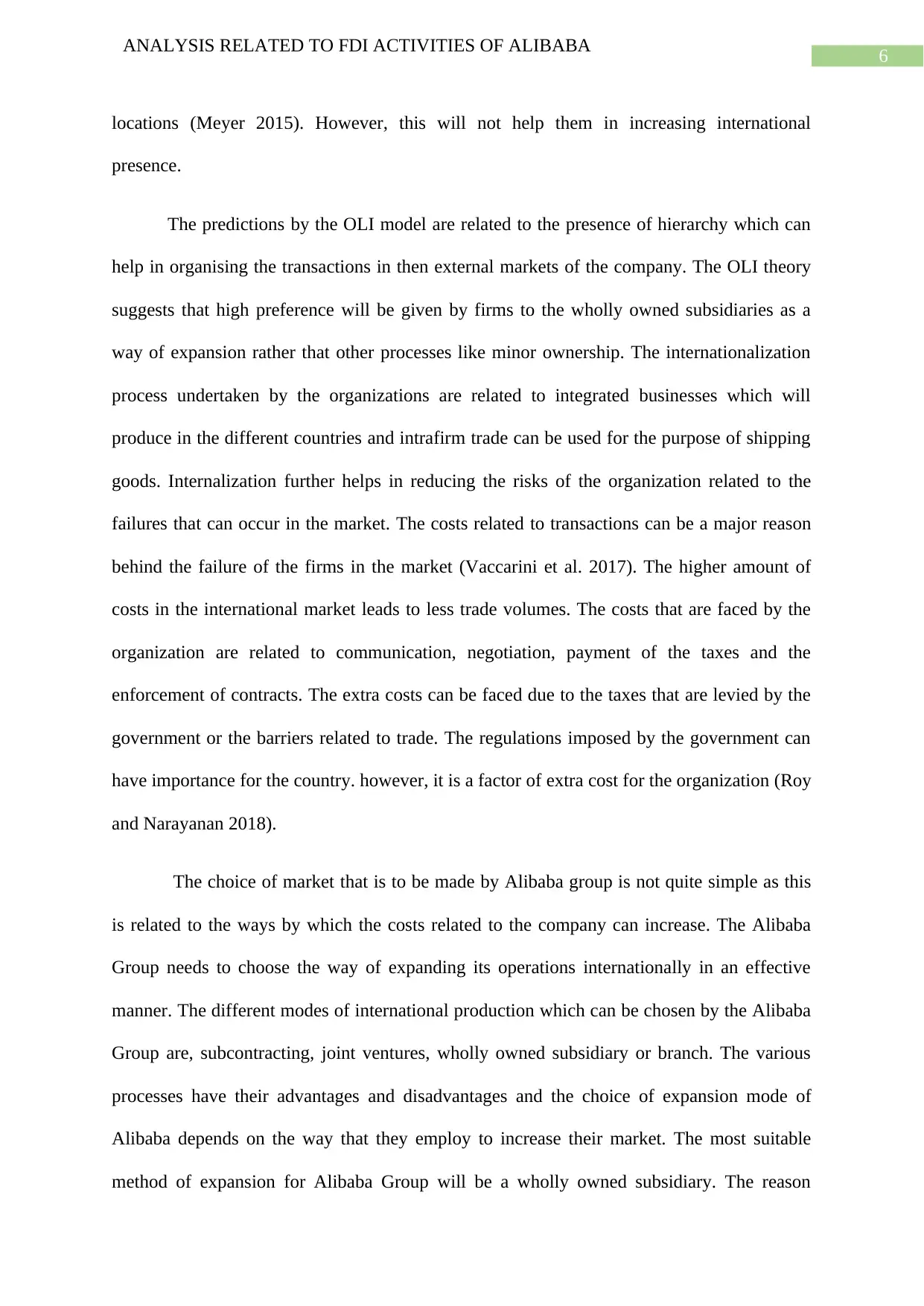
6
ANALYSIS RELATED TO FDI ACTIVITIES OF ALIBABA
locations (Meyer 2015). However, this will not help them in increasing international
presence.
The predictions by the OLI model are related to the presence of hierarchy which can
help in organising the transactions in then external markets of the company. The OLI theory
suggests that high preference will be given by firms to the wholly owned subsidiaries as a
way of expansion rather that other processes like minor ownership. The internationalization
process undertaken by the organizations are related to integrated businesses which will
produce in the different countries and intrafirm trade can be used for the purpose of shipping
goods. Internalization further helps in reducing the risks of the organization related to the
failures that can occur in the market. The costs related to transactions can be a major reason
behind the failure of the firms in the market (Vaccarini et al. 2017). The higher amount of
costs in the international market leads to less trade volumes. The costs that are faced by the
organization are related to communication, negotiation, payment of the taxes and the
enforcement of contracts. The extra costs can be faced due to the taxes that are levied by the
government or the barriers related to trade. The regulations imposed by the government can
have importance for the country. however, it is a factor of extra cost for the organization (Roy
and Narayanan 2018).
The choice of market that is to be made by Alibaba group is not quite simple as this
is related to the ways by which the costs related to the company can increase. The Alibaba
Group needs to choose the way of expanding its operations internationally in an effective
manner. The different modes of international production which can be chosen by the Alibaba
Group are, subcontracting, joint ventures, wholly owned subsidiary or branch. The various
processes have their advantages and disadvantages and the choice of expansion mode of
Alibaba depends on the way that they employ to increase their market. The most suitable
method of expansion for Alibaba Group will be a wholly owned subsidiary. The reason
ANALYSIS RELATED TO FDI ACTIVITIES OF ALIBABA
locations (Meyer 2015). However, this will not help them in increasing international
presence.
The predictions by the OLI model are related to the presence of hierarchy which can
help in organising the transactions in then external markets of the company. The OLI theory
suggests that high preference will be given by firms to the wholly owned subsidiaries as a
way of expansion rather that other processes like minor ownership. The internationalization
process undertaken by the organizations are related to integrated businesses which will
produce in the different countries and intrafirm trade can be used for the purpose of shipping
goods. Internalization further helps in reducing the risks of the organization related to the
failures that can occur in the market. The costs related to transactions can be a major reason
behind the failure of the firms in the market (Vaccarini et al. 2017). The higher amount of
costs in the international market leads to less trade volumes. The costs that are faced by the
organization are related to communication, negotiation, payment of the taxes and the
enforcement of contracts. The extra costs can be faced due to the taxes that are levied by the
government or the barriers related to trade. The regulations imposed by the government can
have importance for the country. however, it is a factor of extra cost for the organization (Roy
and Narayanan 2018).
The choice of market that is to be made by Alibaba group is not quite simple as this
is related to the ways by which the costs related to the company can increase. The Alibaba
Group needs to choose the way of expanding its operations internationally in an effective
manner. The different modes of international production which can be chosen by the Alibaba
Group are, subcontracting, joint ventures, wholly owned subsidiary or branch. The various
processes have their advantages and disadvantages and the choice of expansion mode of
Alibaba depends on the way that they employ to increase their market. The most suitable
method of expansion for Alibaba Group will be a wholly owned subsidiary. The reason
Paraphrase This Document
Need a fresh take? Get an instant paraphrase of this document with our AI Paraphraser
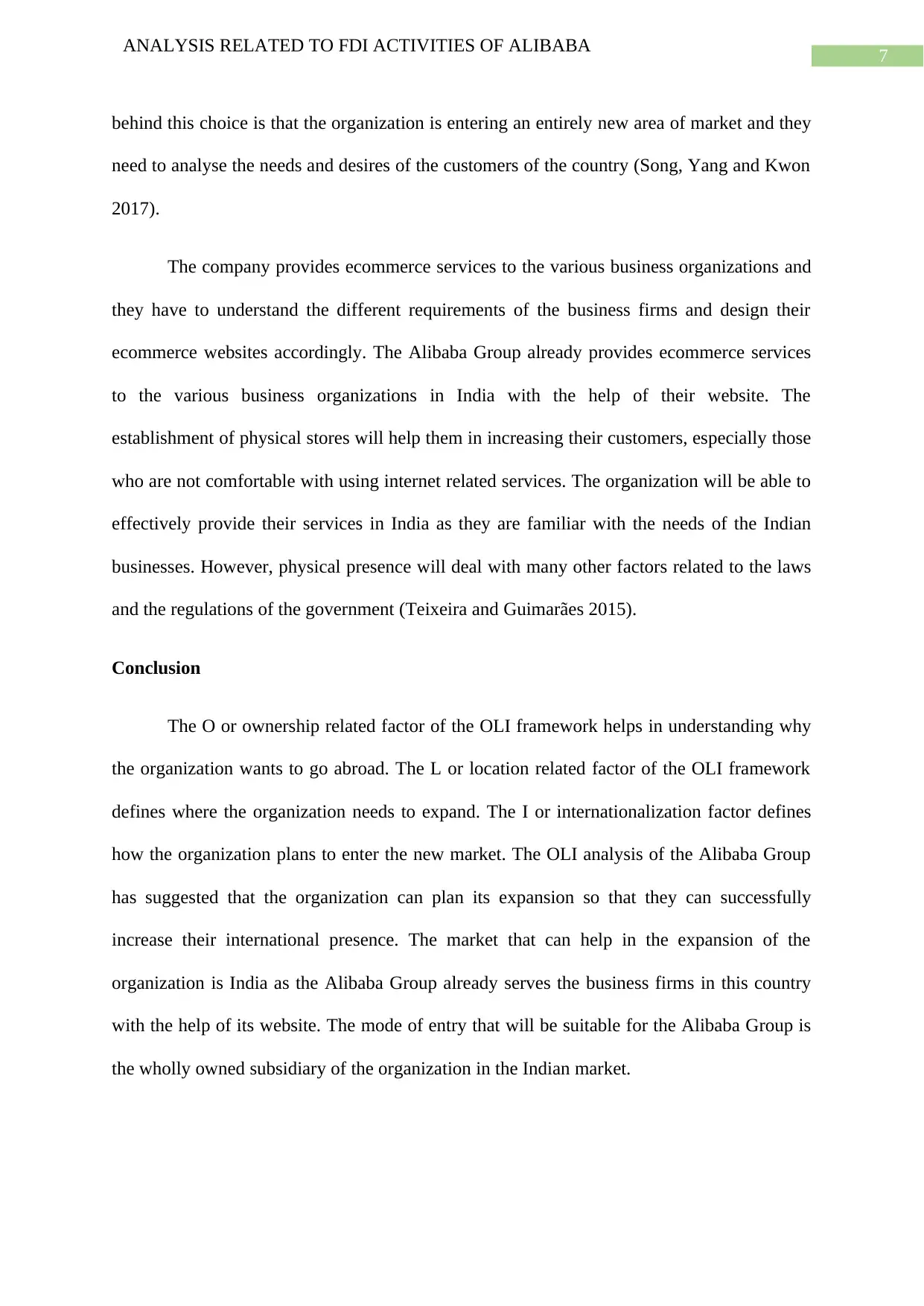
7
ANALYSIS RELATED TO FDI ACTIVITIES OF ALIBABA
behind this choice is that the organization is entering an entirely new area of market and they
need to analyse the needs and desires of the customers of the country (Song, Yang and Kwon
2017).
The company provides ecommerce services to the various business organizations and
they have to understand the different requirements of the business firms and design their
ecommerce websites accordingly. The Alibaba Group already provides ecommerce services
to the various business organizations in India with the help of their website. The
establishment of physical stores will help them in increasing their customers, especially those
who are not comfortable with using internet related services. The organization will be able to
effectively provide their services in India as they are familiar with the needs of the Indian
businesses. However, physical presence will deal with many other factors related to the laws
and the regulations of the government (Teixeira and Guimarães 2015).
Conclusion
The O or ownership related factor of the OLI framework helps in understanding why
the organization wants to go abroad. The L or location related factor of the OLI framework
defines where the organization needs to expand. The I or internationalization factor defines
how the organization plans to enter the new market. The OLI analysis of the Alibaba Group
has suggested that the organization can plan its expansion so that they can successfully
increase their international presence. The market that can help in the expansion of the
organization is India as the Alibaba Group already serves the business firms in this country
with the help of its website. The mode of entry that will be suitable for the Alibaba Group is
the wholly owned subsidiary of the organization in the Indian market.
ANALYSIS RELATED TO FDI ACTIVITIES OF ALIBABA
behind this choice is that the organization is entering an entirely new area of market and they
need to analyse the needs and desires of the customers of the country (Song, Yang and Kwon
2017).
The company provides ecommerce services to the various business organizations and
they have to understand the different requirements of the business firms and design their
ecommerce websites accordingly. The Alibaba Group already provides ecommerce services
to the various business organizations in India with the help of their website. The
establishment of physical stores will help them in increasing their customers, especially those
who are not comfortable with using internet related services. The organization will be able to
effectively provide their services in India as they are familiar with the needs of the Indian
businesses. However, physical presence will deal with many other factors related to the laws
and the regulations of the government (Teixeira and Guimarães 2015).
Conclusion
The O or ownership related factor of the OLI framework helps in understanding why
the organization wants to go abroad. The L or location related factor of the OLI framework
defines where the organization needs to expand. The I or internationalization factor defines
how the organization plans to enter the new market. The OLI analysis of the Alibaba Group
has suggested that the organization can plan its expansion so that they can successfully
increase their international presence. The market that can help in the expansion of the
organization is India as the Alibaba Group already serves the business firms in this country
with the help of its website. The mode of entry that will be suitable for the Alibaba Group is
the wholly owned subsidiary of the organization in the Indian market.
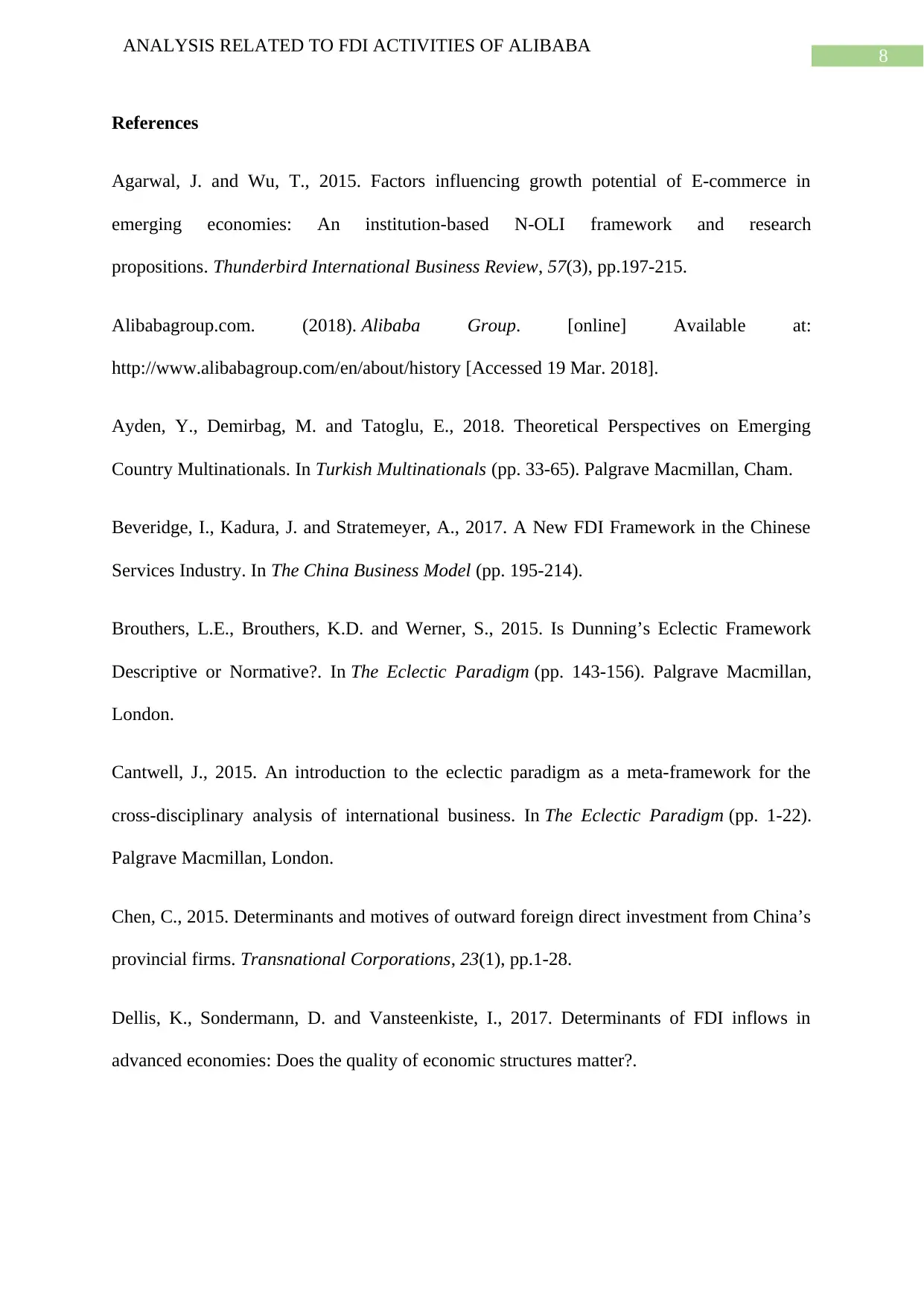
8
ANALYSIS RELATED TO FDI ACTIVITIES OF ALIBABA
References
Agarwal, J. and Wu, T., 2015. Factors influencing growth potential of E‐commerce in
emerging economies: An institution‐based N‐OLI framework and research
propositions. Thunderbird International Business Review, 57(3), pp.197-215.
Alibabagroup.com. (2018). Alibaba Group. [online] Available at:
http://www.alibabagroup.com/en/about/history [Accessed 19 Mar. 2018].
Ayden, Y., Demirbag, M. and Tatoglu, E., 2018. Theoretical Perspectives on Emerging
Country Multinationals. In Turkish Multinationals (pp. 33-65). Palgrave Macmillan, Cham.
Beveridge, I., Kadura, J. and Stratemeyer, A., 2017. A New FDI Framework in the Chinese
Services Industry. In The China Business Model (pp. 195-214).
Brouthers, L.E., Brouthers, K.D. and Werner, S., 2015. Is Dunning’s Eclectic Framework
Descriptive or Normative?. In The Eclectic Paradigm (pp. 143-156). Palgrave Macmillan,
London.
Cantwell, J., 2015. An introduction to the eclectic paradigm as a meta-framework for the
cross-disciplinary analysis of international business. In The Eclectic Paradigm (pp. 1-22).
Palgrave Macmillan, London.
Chen, C., 2015. Determinants and motives of outward foreign direct investment from China’s
provincial firms. Transnational Corporations, 23(1), pp.1-28.
Dellis, K., Sondermann, D. and Vansteenkiste, I., 2017. Determinants of FDI inflows in
advanced economies: Does the quality of economic structures matter?.
ANALYSIS RELATED TO FDI ACTIVITIES OF ALIBABA
References
Agarwal, J. and Wu, T., 2015. Factors influencing growth potential of E‐commerce in
emerging economies: An institution‐based N‐OLI framework and research
propositions. Thunderbird International Business Review, 57(3), pp.197-215.
Alibabagroup.com. (2018). Alibaba Group. [online] Available at:
http://www.alibabagroup.com/en/about/history [Accessed 19 Mar. 2018].
Ayden, Y., Demirbag, M. and Tatoglu, E., 2018. Theoretical Perspectives on Emerging
Country Multinationals. In Turkish Multinationals (pp. 33-65). Palgrave Macmillan, Cham.
Beveridge, I., Kadura, J. and Stratemeyer, A., 2017. A New FDI Framework in the Chinese
Services Industry. In The China Business Model (pp. 195-214).
Brouthers, L.E., Brouthers, K.D. and Werner, S., 2015. Is Dunning’s Eclectic Framework
Descriptive or Normative?. In The Eclectic Paradigm (pp. 143-156). Palgrave Macmillan,
London.
Cantwell, J., 2015. An introduction to the eclectic paradigm as a meta-framework for the
cross-disciplinary analysis of international business. In The Eclectic Paradigm (pp. 1-22).
Palgrave Macmillan, London.
Chen, C., 2015. Determinants and motives of outward foreign direct investment from China’s
provincial firms. Transnational Corporations, 23(1), pp.1-28.
Dellis, K., Sondermann, D. and Vansteenkiste, I., 2017. Determinants of FDI inflows in
advanced economies: Does the quality of economic structures matter?.
⊘ This is a preview!⊘
Do you want full access?
Subscribe today to unlock all pages.

Trusted by 1+ million students worldwide
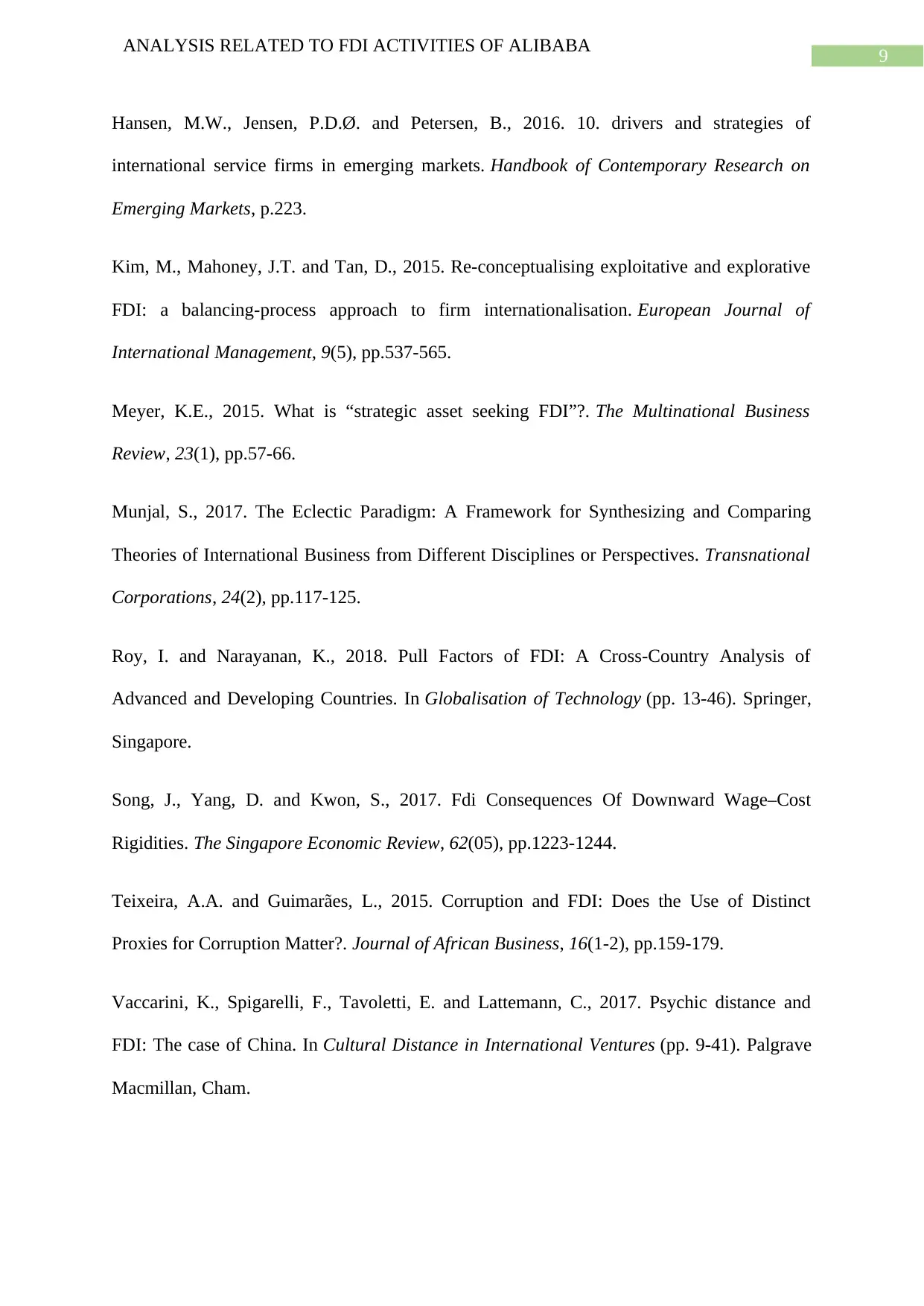
9
ANALYSIS RELATED TO FDI ACTIVITIES OF ALIBABA
Hansen, M.W., Jensen, P.D.Ø. and Petersen, B., 2016. 10. drivers and strategies of
international service firms in emerging markets. Handbook of Contemporary Research on
Emerging Markets, p.223.
Kim, M., Mahoney, J.T. and Tan, D., 2015. Re-conceptualising exploitative and explorative
FDI: a balancing-process approach to firm internationalisation. European Journal of
International Management, 9(5), pp.537-565.
Meyer, K.E., 2015. What is “strategic asset seeking FDI”?. The Multinational Business
Review, 23(1), pp.57-66.
Munjal, S., 2017. The Eclectic Paradigm: A Framework for Synthesizing and Comparing
Theories of International Business from Different Disciplines or Perspectives. Transnational
Corporations, 24(2), pp.117-125.
Roy, I. and Narayanan, K., 2018. Pull Factors of FDI: A Cross-Country Analysis of
Advanced and Developing Countries. In Globalisation of Technology (pp. 13-46). Springer,
Singapore.
Song, J., Yang, D. and Kwon, S., 2017. Fdi Consequences Of Downward Wage–Cost
Rigidities. The Singapore Economic Review, 62(05), pp.1223-1244.
Teixeira, A.A. and Guimarães, L., 2015. Corruption and FDI: Does the Use of Distinct
Proxies for Corruption Matter?. Journal of African Business, 16(1-2), pp.159-179.
Vaccarini, K., Spigarelli, F., Tavoletti, E. and Lattemann, C., 2017. Psychic distance and
FDI: The case of China. In Cultural Distance in International Ventures (pp. 9-41). Palgrave
Macmillan, Cham.
ANALYSIS RELATED TO FDI ACTIVITIES OF ALIBABA
Hansen, M.W., Jensen, P.D.Ø. and Petersen, B., 2016. 10. drivers and strategies of
international service firms in emerging markets. Handbook of Contemporary Research on
Emerging Markets, p.223.
Kim, M., Mahoney, J.T. and Tan, D., 2015. Re-conceptualising exploitative and explorative
FDI: a balancing-process approach to firm internationalisation. European Journal of
International Management, 9(5), pp.537-565.
Meyer, K.E., 2015. What is “strategic asset seeking FDI”?. The Multinational Business
Review, 23(1), pp.57-66.
Munjal, S., 2017. The Eclectic Paradigm: A Framework for Synthesizing and Comparing
Theories of International Business from Different Disciplines or Perspectives. Transnational
Corporations, 24(2), pp.117-125.
Roy, I. and Narayanan, K., 2018. Pull Factors of FDI: A Cross-Country Analysis of
Advanced and Developing Countries. In Globalisation of Technology (pp. 13-46). Springer,
Singapore.
Song, J., Yang, D. and Kwon, S., 2017. Fdi Consequences Of Downward Wage–Cost
Rigidities. The Singapore Economic Review, 62(05), pp.1223-1244.
Teixeira, A.A. and Guimarães, L., 2015. Corruption and FDI: Does the Use of Distinct
Proxies for Corruption Matter?. Journal of African Business, 16(1-2), pp.159-179.
Vaccarini, K., Spigarelli, F., Tavoletti, E. and Lattemann, C., 2017. Psychic distance and
FDI: The case of China. In Cultural Distance in International Ventures (pp. 9-41). Palgrave
Macmillan, Cham.
Paraphrase This Document
Need a fresh take? Get an instant paraphrase of this document with our AI Paraphraser

10
ANALYSIS RELATED TO FDI ACTIVITIES OF ALIBABA
Appendices
Appendix 1
ANALYSIS RELATED TO FDI ACTIVITIES OF ALIBABA
Appendices
Appendix 1
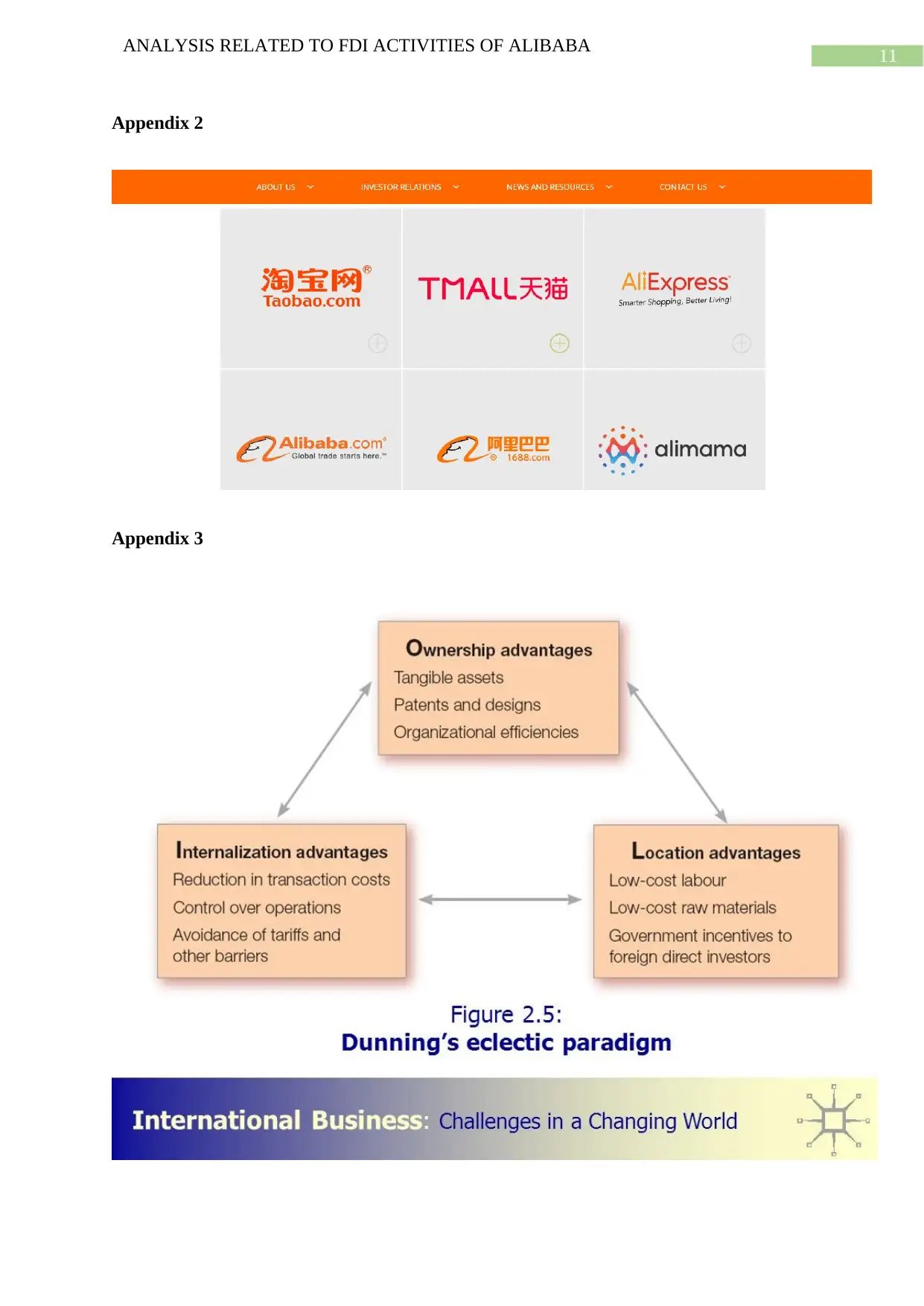
11
ANALYSIS RELATED TO FDI ACTIVITIES OF ALIBABA
Appendix 2
Appendix 3
ANALYSIS RELATED TO FDI ACTIVITIES OF ALIBABA
Appendix 2
Appendix 3
⊘ This is a preview!⊘
Do you want full access?
Subscribe today to unlock all pages.

Trusted by 1+ million students worldwide
1 out of 12
Related Documents
Your All-in-One AI-Powered Toolkit for Academic Success.
+13062052269
info@desklib.com
Available 24*7 on WhatsApp / Email
![[object Object]](/_next/static/media/star-bottom.7253800d.svg)
Unlock your academic potential
Copyright © 2020–2026 A2Z Services. All Rights Reserved. Developed and managed by ZUCOL.





